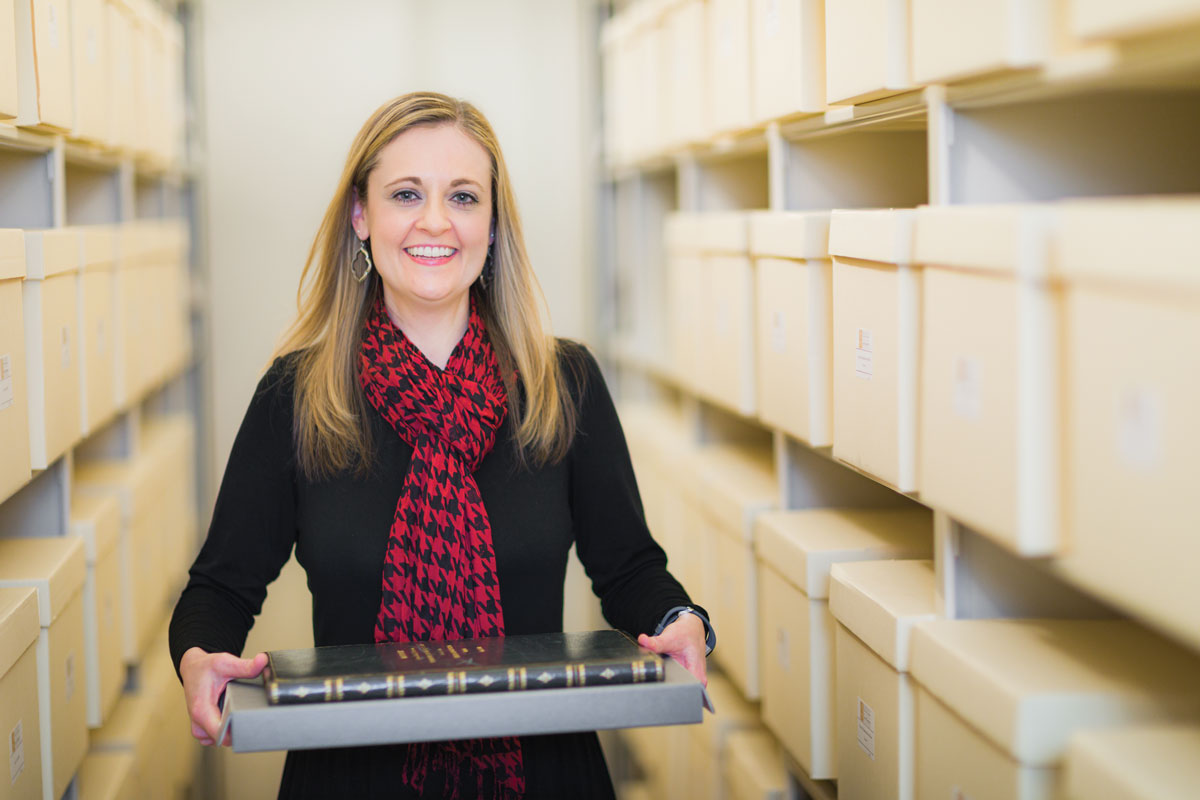BEHIND THE SCENES

To Preserve and Protect
Archivist Safeguards Association Documents
The archives of the Mount Vernon Ladies’ Association hold a fascinating collection of treasures. In considering their contents, MVLA archivist Rebecca Baird points out one of her favorite items in the collection: the original 1858 signed agreement between John Augustine Washington III and Ann Pamela Cunningham, transferring ownership of Mount Vernon.
“It is signed ‘A Southern matron,’ which was Ann Pamela Cunningham’s pseudonym,” Baird notes. “It was such a significant moment for her personally, but she knew she needed to focus on the work that lay ahead of her in raising the money to pay for the property.”
Details like this aren’t lost on Baird. An ardent and unabashed admirer of the MVLA, Baird relishes the opportunities her role as archivist has presented her with over the past five years. By combing through the Association’s records and making them available to scholars, staff, and the public, she has become an expert on matters of institutional history.
Most of the documents that land in Baird’s hands are passed along by employees, Board members, and even past Mount Vernon visitors who aren’t sure what to do with their old files, photos, and other materials. She receives one or two such donations a month, which she evaluates according to Mount Vernon’s collection policy. If she accepts the donation, the real work begins. For a collection of materials, Baird would organize it and write finding aids (essentially a road map with information such as the history, dates, and creator). For single items, she must decide where it belongs in the collection. She then makes the materials available to the public through the Library’s archives database and digital collections (accessible on mountvernon.org).
As she sifts through the papers, she often discovers delightful surprises.
“Finding little gems within the materials, like great photos we don’t have or a menu to an event with royalty, means that they don’t have to stay hidden; we can share them with everyone,” she says.
Beyond processing the materials that end up in her care, Baird also monitors auction house websites for items related to Mount Vernon or the MVLA that are not currently in its collections. A recent example of her finds is a circa-1940s menu from the Little Hatchet Tavern, the on-site restaurant that later became the Mount Vernon Inn.
“We didn’t have one of these yet in the archives, and it’s a great representation of Mount Vernon during this era,” she explains.
What is the number one acquisition on Baird’s wish list? MVLA founder Ann Pamela Cunningham wrote an editorial in the Charleston Mercury, published on December 2, 1853, which began the movement to rescue George Washington’s home. Mount Vernon has only a reproduction clipping of the piece, and Baird would love to have the entire newspaper.
“It is the first appeal in support of saving Mount Vernon. I think it’s going to be hard to find,” she says. “I’m even looking for it on eBay.”
Many people would long for Baird’s organizing skills in weeding out treasures, preserving them, and organizing them in a way that’s both useful and sustainable.
“When it comes to preserving materials, I always suggest that people invest in archival quality folders, acid-free boxes, and mylar sleeves, which will help keep papers and photos safe for generations, but organizing these materials is another matter,” she continues. “Archivists follow specific theories and principles, but in general, I recommend that you hang on to records that will tell your family more about you, such as your school and employment history, awards you received, and classes you took, along with all of your vital records and official documents like birth certificates and marriage certificates. Keep them in a safe place so that your family can pass them down.”